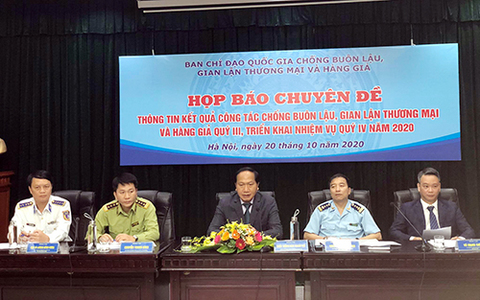
Tax officials and relevant authorities gather in a press conference reviewing the fight against smuggling, trade fraud and fake goods in the third quarter in Ha Noi last week. — Photo cand.com.vn
Due to the rapid development of e-commerce, especially during the COVID-19 pandemic, regulating the sector has become increasingly complex for tax authorities, according to Vu Manh Cuong, director of the Inspection Section under the General Department of Taxation (GDT).
Cuong was speaking at a press conference reviewing the fight against smuggling, trade fraud and fake goods in Ha Noi last week.
"The COVID-19 pandemic has enhanced the habit of buying and selling via e-commerce, mostly in Ha Noi and HCM City, with developed information technology platforms," Cuong said.
He said the tax industry has accelerated efforts to collect tax from those who do business on e-commerce platforms, especially YouTube, Google and Facebook, and found tax violators.
Cuong said they have collected tax arrears of VND13.9 billion (US$604,000) from those earning a living from social networks.
According to data provided by commercial banks, there were 18,304 individuals and organisations that earned VND1.462 trillion on Google, Facebook and YouTube so far this year.
Per the Law on Cyber Security, Cuong said foreign enterprises earning income in Viet Nam are obliged to declare and pay taxes with local tax authorities, with Netflix included.
“With the case of Netflix, we have co-ordinated with the Anti-Money Laundering Department from the State Bank of Vietnam to list how much tax is to be collected for its activities in the past few years."
"Netflix leaders have worked with the Ministry of Finance and the GDT to set up a data office in Viet Nam as well as carry out all relating tax obligations," he added.
Cuong said the taxation industry has deployed many solutions and worked with other ministries and departments to collect e-commerce taxes. It has worked with the Ministry of Industry and Trade (MoIT), the ministry of Information Communication (MIC) to collect information and data and management measures for online business activities to tax offices.
At the same time, local commercial banks were responsible for providing data of relating online trading requested by the GDT so tax officials can make a database to compile a tax management mechanism for businesses in the e-commerce sector. — VNS